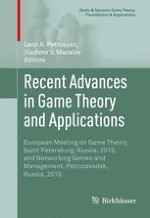2016 | OriginalPaper | Buchkapitel
Occurrence of Deception Under the Oversight of a Regulator Having Reputation Concerns
verfasst von : Ayça Özdog̃an
Erschienen in: Recent Advances in Game Theory and Applications
Aktivieren Sie unsere intelligente Suche, um passende Fachinhalte oder Patente zu finden.
Wählen Sie Textabschnitte aus um mit Künstlicher Intelligenz passenden Patente zu finden. powered by
Markieren Sie Textabschnitte, um KI-gestützt weitere passende Inhalte zu finden. powered by
